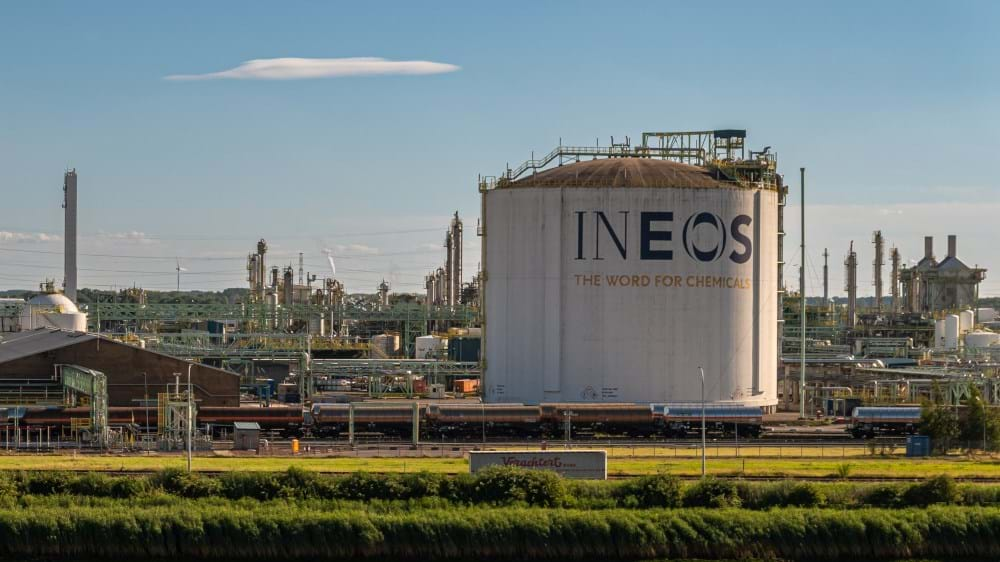Ineos to close world’s second largest phenol plant, blaming European energy costs and carbon tax

INEOS has announced it intends to close its phenol and acetone manufacturing plant in Gladbeck, Germany, blaming “sky high European energy costs” and “Europe’s punitive CO2 tax policy”.
The UK-based company’s decision follows a “detailed strategic review”. Ineos has not confirmed when it plans to stop production at the plant, which employs 279 people and supports a further 1,500 workers indirectly, but the company did confirm to TCE that they plan to move phenol production to Antwerp, Belgium in 2027.
Ineos said that high electricity costs and carbon taxes in Europe have left domestic chemicals manufacturing vulnerable to Chinese production and global oversupply.
Phenol and acetone are produced by converting benzene and propylene in the cumene process. Ineos’ plant in Gladbeck is the world’s second largest phenol plant, producing 650,000 t/y of the chemical along with 400,000 t/y of acetone. The site, owned by Ineos since 2001, has been manufacturing phenol and acetone since 1954 when it was opened by Phenolchemie.
End uses for Ineos’ phenol include rear light clusters in cars, resins used in printed circuit boards, wind turbine blades and automotive brake pads. Ineos said a reduction in local demand for the chemicals had contributed to Gladbeck’s woes. It cited permanent closures of phenol and acetone-using plants operated by Sasol, Weylchem, Mitsubishi, Onlin, and Trinsea, telling TCE the companies had “placed assets in the long-term mothball status”.
Ineos chairman Sir Jim Ratcliffe said: “This is the consequence of Europe’s total lack of energy competitiveness and the blind devotion to carbon taxation which is leading to a mass deindustrialisation across the continent. Gladbeck is not the first and will definitely not be the last unless the regulators wake up and take action.”
Ratcliffe’s warnings
Ratcliffe has been vocal in his criticism of European and UK energy policy in recent months. Following the closure of Ineos’ ethanol plant in Grangemouth, UK in January, Ratcliffe warned that domestic chemicals manufacturing faced “extinction”. He followed up in April by saying he believed the UK’s carbon reduction policies needed a “rethink” to avoid further plant closures.
Energy costs in Europe are not as high as they are in the UK and have been falling recently, although they remain around twice as high as US prices. UK prices are around four times greater than in the US.
Many energy-intensive industries in Europe benefit from exemptions to general taxation on carbon emissions, but they suffer from high electricity prices which are subject to carbon tax on emissions from electricity generators.
The EU approved a scheme last year to compensate energy-intensive industries in Germany with €27.5bn (US$31.8bn) for “indirect emissions costs” levied on generators but absorbed by consumers, with the goal of lowering the risk of “carbon leakage” – the threat of an exodus of European producers to countries with lower carbon tax regimes.
In April, Ineos told TCE the company was now struggling to reduce emissions having cut them by 60% between 2005 and 2024 after targeting the “low hanging fruit”. At Gladbeck, Ineos cut 15,000 tCO2e between 2023 and 2024 by switching steam production from heavy fuel oil to natural gas. Ineos’ global scope 1 and 2 emissions fell from 25.6m tCO2e in 2019 to 19.8m tCO2e in 2024, amounting to around a 23% reduction, although it is unclear how much of this was due to plant closures.
Recent Editions
Catch up on the latest news, views and jobs from The Chemical Engineer. Below are the four latest issues. View a wider selection of the archive from within the Magazine section of this site.




